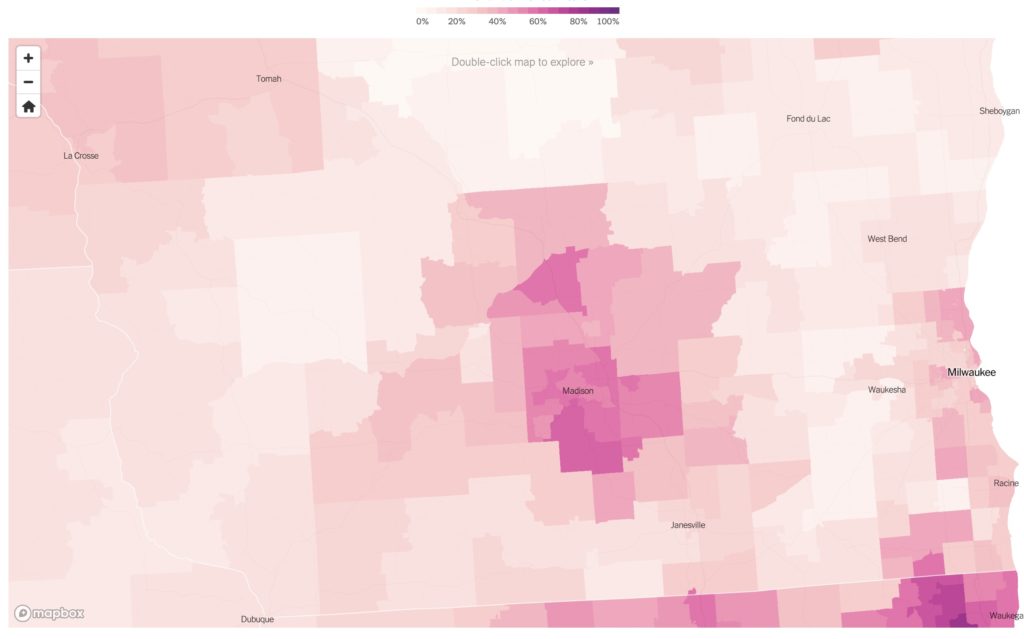Updated evening of 7.22.20 with meeting video. (The discussion on Whitewater’s mask ordinance runs from 31:09 to 3:37:50.)
At last night’s meeting of the Whitewater Common Council, the seven-member council voted unanimously for a temporary mask ordinance, taking effect 8.1.20 and running through 12.31.20, requiring masks in parts of buildings open to the public, and for a few outdoor venues (farmers’ markets, for example, held on Tuesdays and Saturdays). The council waived a second reading of the ordinance. At the request of the Whitewater Unified School District’s new administrator the ordinance will apply to K12 public schools within the city.
A few remarks —
. 1. Science. There is ample evidence that masks are useful to limit the spread of the novel coronavirus. Arguments to the contrary often rely on distortions of data from America and abroad, and false analogies that rely on no data at all. Much – too much – credence has been given to these unfounded counterarguments.
. 2. Liberty Arguments. As I mentioned yesterday, there is a libertarian case – grounded in science, relying on personal responsibility – for wearing a mask. (See About That Proposed, Temporary Mask Ordinance for Whitewater, Wisconsin citing A Libertarian Case for Masks.) One would have preferred (obviously) that an ordinance was not necessary, but here one faces a pandemic that – by its spread – inhibits free association among people. Those who argue that a limited requirement for masks (with exceptions) for a limited time (a pandemic) is an infringement on liberty should consider that the far greater infringement on liberty will come if this pandemic is not stopped before free association among people becomes impossible. The sick and dead do not gather freely in the marketplace; illness and mortality confines them to hospitals and morgues.
3. Widespread Failure of Teaching and Government. If we haven’t taught well – and as a society we haven’t as misinformation easily spreads – we have not elected well, either. At the federal level particularly, we face a flood of lies, misinformation, and selfishness that has made this pandemic vastly worse than it might have been. The most advanced society in all the world has been reduced to the condition of an under-developed, contagion-stricken nation. It’s only through the efforts of thousands of private doctors, healthcare workers, and sensible state and local officials that our situation is not worse.
4. Public K12 Application. As passed, the ordinance will apply – by not exempting – public K12 buildings within the city. That answers a question for the district, as long as the school board does not request an exemption in an amended municipal ordinance.
This is easily one of the most significant applications of the ordinances, and it makes sense to me.
If a mask requirement is to have value for Whitewater, it will need to apply to large publicly-accessible buildings within the city, including the public schools located here. If the Whitewater School Board retreats on this point, and if the City of Whitewater thereafter relents, the reach of mask requirement will be significantly narrower. Requirements for public buildings in Whitewater – if they’re genuine in their effort to protect public health – shouldn’t have exemptions for densely-populated public facilities. To do otherwise would make an ordinance merely ornamental.
Oddly, a local newspaper story, at the time of this writing, doesn’t expressly mention this reach. A local website at which the council president describes himself as a staff writer also describes this application only by implication: “Exceptions include….Private K-12 schools, childcare or youth facilities that have a comprehensive safety plan in place.”
5. ‘Communication.’ This ordinance would have sparked less controversy if the case for it had been better made in advance. Instead, the only item in the agenda about the ordinance was the draft itself. Honest to goodness: it was treated beforehand like a hot potato left on a table, to see if it would grow cool enough to touch. It shouldn’t have been presented that way. Most people don’t spend time reading ordinance drafts. Proponents should have shown more work to the public: to have enough confidence in their case to present it with summaries and explanations (e.g., what will this require? and what won’t the draft require?).
Much work will now have to be done in a short time. Preparations should have been more advanced & more public (as part of a proposal).
6. Emails. During the discussion, the council president mentioned that he received something near one-hundred emails about this matter. That might seem like a lot, but it’s not a large number compared to nearby towns with controversial issues. Nearby cities smaller than Whitewater have received more public comments (or attendance) for notable issues they’ve faced. There’s much less engagement in Whitewater than is good for the community, and that the community leaders are willing to admit.
7. Three Minutes’ Time. If a community has trouble with engagement, it does no good for the council president to ask that commenters not repeat themselves. If commenters’ have three minutes’ time to speak, and they stay on topic, they should be encouraged to use that time however they speak. Perhaps they will repeat themselves, or others: what harm is that compared to the participatory gain? Three minutes – even multiplied by many people – is hardly an imposition on the council’s time. If Sec. Clinton could offer eight hours of testimony under questioning over an eleven-hour span during the Benghazi hearings, others should take her example under their own easier circumstances without that kind of cautionary remark to residents. This isn’t a small point: simply let people talk as they wish.
The mask ordinance is a necessary expedient; implementation and compliance will yet tell the tale.




